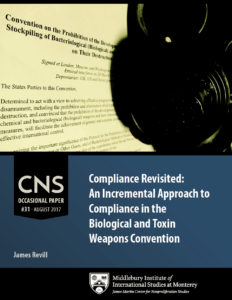August 22, 2017
James Revill
Occasional Paper #31
Read the full Occasional Paper #31:
Revisiting Compliance in the Biological Weapons Convention
 Since the collapse of negotiations around a protocol to the 1972 Biological and Toxin Weapons Convention (BWC) in 2001, states parties have begun to discuss several novel issues linked to the broader implementation of the BWC as part of a series of intersessional meetings. While initially fruitful, this approach has generated diminishing returns in the last five years. Moreover, in addressing these broader issues of implementation, biological disarmament diplomacy has largely neglected the thorny issue of compliance.
Since the collapse of negotiations around a protocol to the 1972 Biological and Toxin Weapons Convention (BWC) in 2001, states parties have begun to discuss several novel issues linked to the broader implementation of the BWC as part of a series of intersessional meetings. While initially fruitful, this approach has generated diminishing returns in the last five years. Moreover, in addressing these broader issues of implementation, biological disarmament diplomacy has largely neglected the thorny issue of compliance.
Compliance with the BWC is more than a simple binary choice to sign a commitment not to develop or produce biological weapons. It requires the adherence to all the obligations, both negative and positive, undertaken by BWC states parties in signing and ratifying the convention. In the BWC context, this is complicated by the ambiguity surrounding certain obligations, changes in science and security, and the limited resource capacity of some states to fulfill their obligations. Under such circumstances, without episodically revisiting compliance, there remains the risk that BWC will become ever more fragmented, outmoded and poorly implemented.
Although many states insist strengthening the convention can only be achieved through a multilaterally negotiated, legally binding verification protocol, this is not politically feasible for the foreseeable future. Nor is this necessarily true; an incremental approach to strengthening the convention could be pursued, dealing with mutually reinforcing components of the regime in a balanced manner and laying the foundations for future work, if and when it becomes politically expedient to proceed.
This Occasional Paper proposes a number of activities that could be pursued as part of an incremental approach to revisiting compliance with the BWC.
